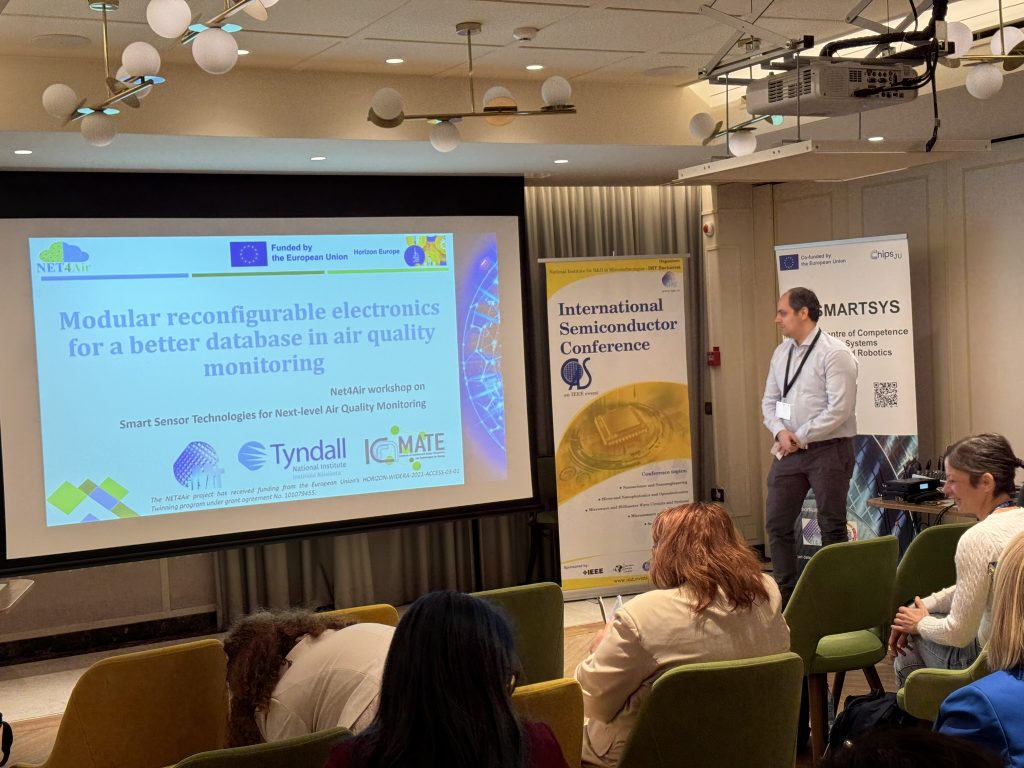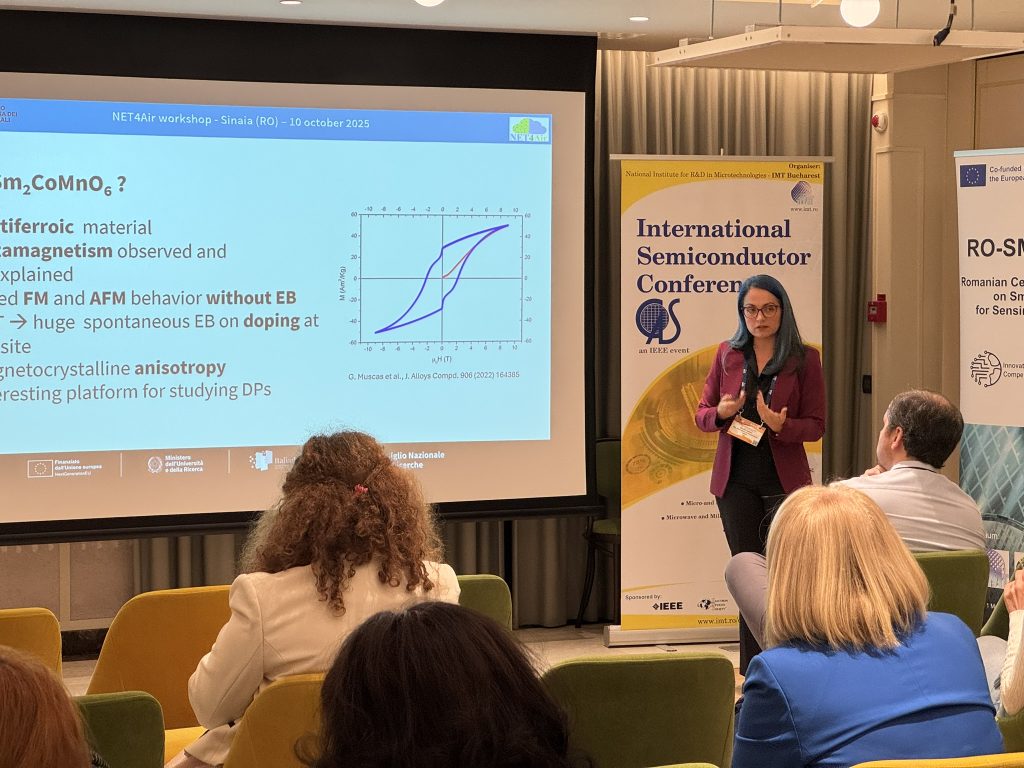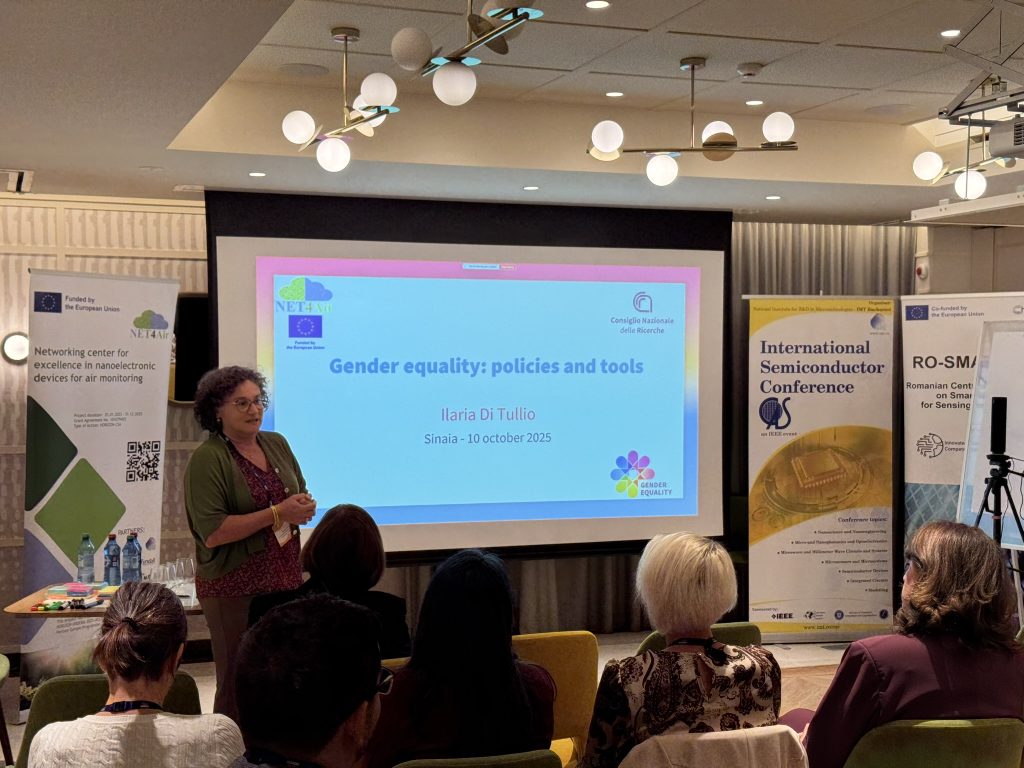This years’ implantation of the NET4Air’ Workshop took place on October 10, as an extension of the CAS International Semiconductor Conference, IEEE event. At this event members of the NET4Air Centre of Excellence have shared their contribution to polluting gas sensing, highlighting both new techniques for their production and insights into their functionality. This science centered discussion was then followed by a series of activities promoting inclusivity and bias awareness within science in a second event entitled “Awareness into Action: Ideas for an Inclusive Scientific Culture“.
The workshop agenda was as follows:
| Time | Presentation | Speaker |
|---|---|---|
| 11:30 – 11:35 | Opening Statement | Carmen Moldovan IMT-Bucharest |
| 11:35 – 11:55 | Electrodeposited PANI/Azulene Films on IDEs for Formaldehyde Detection: A Preliminary Study | Alexandru Grigoroiu IMT-Bucharest |
| 11:55- 12:15 | PANI- based resistive chemosensors: a morphological study | Alessia Famengo CNR-ICMATE |
| 12:15 – 12:30 | Modular reconfigurable electronics for a better database in air quality monitoring | Silviu Dinulescu IMT-Bucharest |
| 12:30 – 12:45 | Piezoelectric MEMS energy harvester systems for portable array sensors | George Muscalu IMT-Bucharest |
| 12:45 – 13:00 | Magnetic behavior and antisite defects in Sm2CoMnO6 double perovskite: insights from first-principles calculations | Claudia Caddeo CNR-IoM |
| 13:00 – 13:15 | PANI-based resistive chemosensors for sensitive and selective gas detection | Iulia Antohe INFLPR |
Hotel Sinaia


Carmen Moldovan, the NET4Air project coordinator and the Director of the Research Center for Integration of Technologies and Head of Laboratory of Microsystems for Biomedical applications within IMT-Bucharest welcomed the participants to the workshop through an introduction to the NET4Air project and the progress that was achieved within its course. This introduction was followed by a talk from Alexandru Grigoroiu, presenting the newest achievements of the NET4Air project regarding formaldehyde sensing, and how the new solution better tackles the monitoring of this VOC.


Following the topic of gas sensors, Alessia Famengo presented the work performed at CNR-ICMATE for better understanding the interaction of polyaniline based gas sensors with ammonia, and how the addition of carbonic materials can change the modes of responding to their favored gases. Silviu Dinulescu then transitioned to the electronics aspects of gas monitoring, highlighting the requirements and current progress towards the development of a platform for the simultaneous reading and transmission of data from multiple gas sensors.


Staying within the topic of devices, George Muscalu then presented solutions for powering such multi sensors monitoring platforms, with his talk focusing mainly on indoor monitoring and how energy harvesters can be employed to power such devices. Then Claudia Caddeo went into an in depth presentation on how the structure of perovskite can influence its physical properties and its resulting efficiency.


To conclude the workshop, Iulia Antohe presented a new technique for the fabrication of polyaniline based chemosensors, and the effect of irradiation on their performance. After a short break, Monica Favaro and her colleagues: Ilaria Di Tullio, Melanie Timpel, Claudia Caddeo and Luisa Neri, engaged in a series of talks and activities on combating bias in science and creating a more inclusive environment for all those passionate about research.
